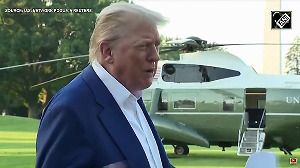Addressing concerns of Indian industry doing business in China, Prime Minister Manmohan Singh on Monday said the governments of both the countries will work together to put in place an environment for greater trade, investment and economic interaction by creating a level-playing field, dealing with issues such as non-tariff barriers, IPR protection and market-related exchange rates.
"I would like to assure this gathering that both governments will work together to put in place an enabling environment for greater trade, investment and economic interaction. This has to include creating a level-playing field by addressing such issues as non-tariff barriers, intellectual property rights (IPR) protection and market-related exchange rates," Singh said.
"Our two economies are becoming engines of economic growth and must use our natural and human resources, technology and capital for the common benefit of the region," Singh said in his address at the India-China Economic, Trade and Investment Summit on the second day of his three-day maiden visit to China.
Noting that the bilateral trade with China has doubled in the last two years, Singh said the trade target of $20 billion set by 2008 was reached two years ahead of schedule and the revised target of $40 billion by 2010 was likely to be achieved two years in advance.
"This makes me wonder whether our two governments have been underestimating the capabilities of our respective industries and a strong urge to do business with each other. We therefore propose to set more ambitious targets," he said ahead of his meetings with the top Chinese leadership.
Touching on a point of concern to the Indian trade and industry -- adverse trade deficit with China -- Singh said the challenge before India in the area of trade was to diversify export basket to China.
The industry leaders, including CII chief Sunil Mittal and FICCI President F Khorakiwala had sought the prime minister's intervention with Beijing for early removal of trade and non-trade barriers imposed by China. "I would urge Indian business to vigorously pursue opportunities for expanding non-traditional items of export. Such efforts, when matched by greater market access for Indian goods in China, will help to bridge the rising trade deficit between us," Singh said.
The prime minister said there were enormous opportunities for both India and China to expand trade in services, particularly in construction and engineering, education, entertainment, financial services, IT and IT-enabled services, transport, tourism and health.
"We will work together with the Chinese government to remove administrative barriers and simplify regulatory regimes in order to move forward in these areas," he said.
The services sector accounts for more than 50 per cent of India's gross domestic product and more than 40 per cent of China's GDP. India has had considerable success in positioning itself in hi-tech services in world markets.
Acknowledging the fact that Chinese firms have contracted projects in India worth over $12 billion and the Indian majors setting up a number of joint ventures or subsidiaries in China in pharmaceuticals and software sectors, he said the two countries must strengthen the base of economic cooperation through business alliances and collaboration in technology transfer and development.
"We seek to promote bilateral investments in traditional sectors such as petrochemicals, steel, health care, IT and automobiles. Equally, our entrepreneurs should explore opportunities in new areas such as bio-technology, advance materials, renewable energy and low-carbon technologies," Singh said.
The prime minister suggested a three-pronged strategy for the chambers of industry and commerce of both the countries to achieve these objectives by first jointly developing a strategic plan for the future so that there was a vision of economic cooperation and a roadmap for its implementation.
This, he said, will ensure that a long-term strategic perspective that looks ahead to future challenges and opportunities guiding the ties.
He said that India and China could develop profitable business models that factor in complementarities and competitive strengths and the special needs of their large markets. "The opportunities are many and innovation is the key to exploiting them."
He said the business and industry of the two countries need to acquire insights into each other's markets, business customs and management styles. In the final analysis, doing business is about developing and understanding trust in partners.
Additionally, the business communities of the two countries should develop a deeper understanding of the macro-economic outlook, the regulatory regimes and of factors that have a bearing on the competitiveness of enterprises.
The prime minister noted that the number of visitors exchanged between the two countries approached the half million mark last year and direct flight connections have risen to 22 a week. "We need to encourage this growing interaction including through easier grant of visas.






